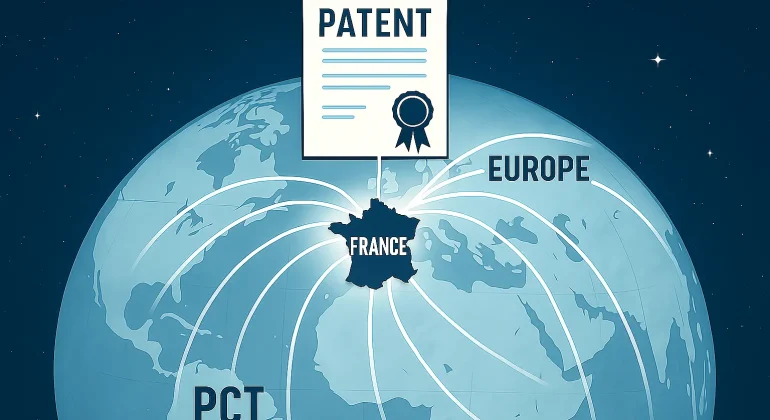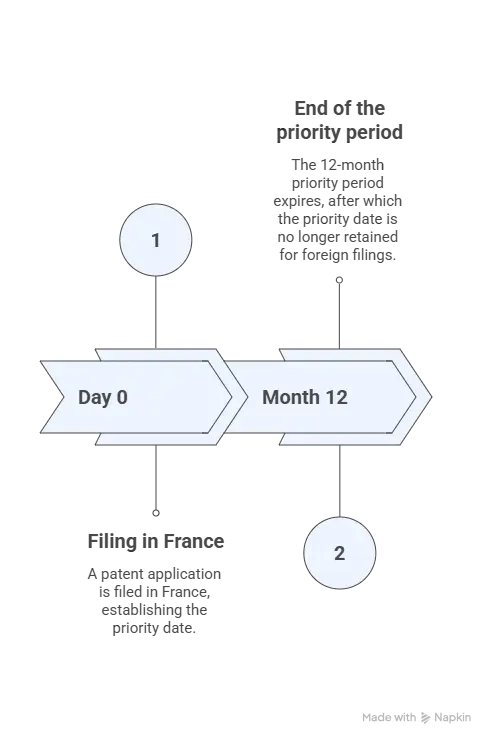Sommaire
Introduction: why protect an innovation?
Filing a patent is a decisive step in securing a competitive advantage and maximizing returns on research and development investments. In today’s globalized context, it is crucial to understand the French national procedure, as well as the European and international mechanisms such as the PCT (Patent Cooperation Treaty).
Filing a patent in France: steps, costs and ownership
The procedure before the INPI
In France, the patent application is filed with the Institut National de la Propriété Industrielle (INPI). The application must contain a technical description, claims, an abstract, and, where relevant, drawings.
After a formal examination, the European Patent Office (EPO) issues a search report, which is then forwarded to the INPI. The applicant may amend the claims before the INPI examines the patentability criteria:
- Novelty: the invention must not already exist in the prior art.
- Inventive step: the invention must not be obvious in light of existing technology.
- Industrial applicability: the invention must be capable of being used in industry or agriculture.
If these requirements are met, the patent is granted and published.
Who owns the patent?
As a general principle, the inventor is the patent holder. However, in the case of employee inventions made in the course of employment, the patent belongs to the employer, pursuant to Articles L.611-6 and L.611-7 of the French Intellectual Property Code. Ownership may also be transferred or shared by contract.
Costs and professional fees
Official fees include:
- filing fee: approx. €26,
- search report: €520,
- annual renewal fees starting in the 2nd year: €38, gradually increasing.
In practice, taking into account the drafting of the application, correspondence, and strategy, the overall cost ranges between €4,000 and €8,000.
The priority period
A French filing establishes a 12-month priority right (Paris Convention). During this time, the applicant may extend protection abroad while retaining the original filing date.
Opposition and duration of protection
The opposition procedure
Since 2020, any third party may file an opposition before the INPI against a granted patent, on grounds such as lack of novelty, inventive step, or clarity. This administrative procedure is faster and less costly than court litigation.
Duration of protection
The duration of a French patent is 20 years from the filing date, subject to the payment of annual renewal fees. For pharmaceuticals and plant protection products, a Supplementary Protection Certificate (SPC) may extend protection by up to 5 additional years.
Comparison between national patent, European patent and PCT
The French patent
The national patent is limited to the French territory. It is a quick and cost-effective option for protecting an invention in the domestic market.
The European patent (EPO procedure)
The application is filed with the European Patent Office (EPO). After a centralized examination, the patent must be validated country by country in the designated states. The European patent thus becomes a bundle of national rights.
The PCT and its strategic role
The Patent Cooperation Treaty (PCT) allows applicants to file a single international application covering more than 150 countries. It does not result in a global patent but extends the decision period to 30 or 31 months. This procedure provides valuable time to assess markets, seek investors, and plan a strategy before entering the national or regional phases.
Strategic impacts to anticipate
Market expansion
Through the PCT and the European patent, companies can progressively expand their protection according to commercial opportunities.
Anticipating litigation
A carefully structured patent portfolio strengthens the company’s capacity to act against infringers and to secure business partnerships.
Enhancing company value
Patents are intangible assets that increase corporate credibility, particularly in fundraising, licensing, or acquisition operations.
Conclusion
The French patent filing procedure, combined with the European and PCT systems, provides a powerful framework for innovation protection. By mastering costs, deadlines, and strategic options, companies can optimize the value of their creations and strengthen their competitiveness.
Dreyfus Law firm assists its clients in managing complex intellectual property cases, offering personalized advice and comprehensive operational support for the complete protection of intellectual property.
Dreyfus Law firm is partnered with a global network of lawyers specializing in intellectual property.
Nathalie Dreyfus with the assistance of the entire Dreyfus team.
FAQ
1. What is the cost of filing a patent in France?
Official fees are modest, but including drafting and professional support, the overall cost ranges from €4,000 to €8,000.
2. How long does a French patent last?
20 years from filing, subject to annual renewal fees.
3. What is the deadline to extend a French patent abroad?
12 months (priority right).
4. Is the PCT a global patent?
No, it is an international procedure that centralizes and defers the process.
5. Who owns an invention created by an employee?
As a rule, the employer owns the patent, pursuant to the Intellectual Property Code.


